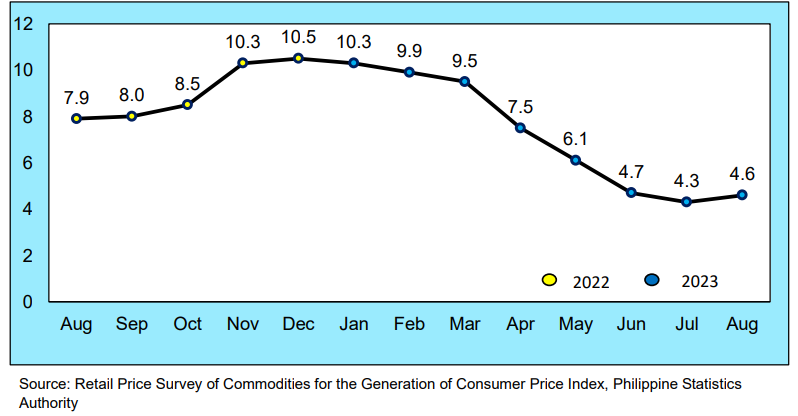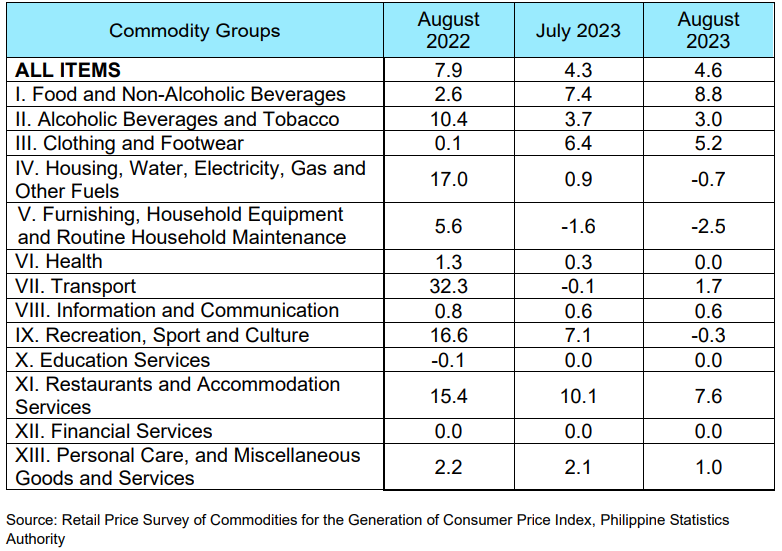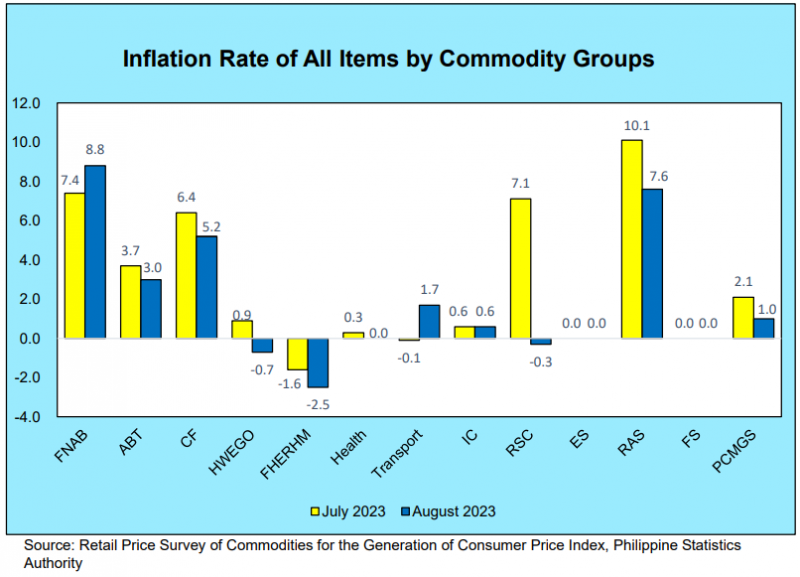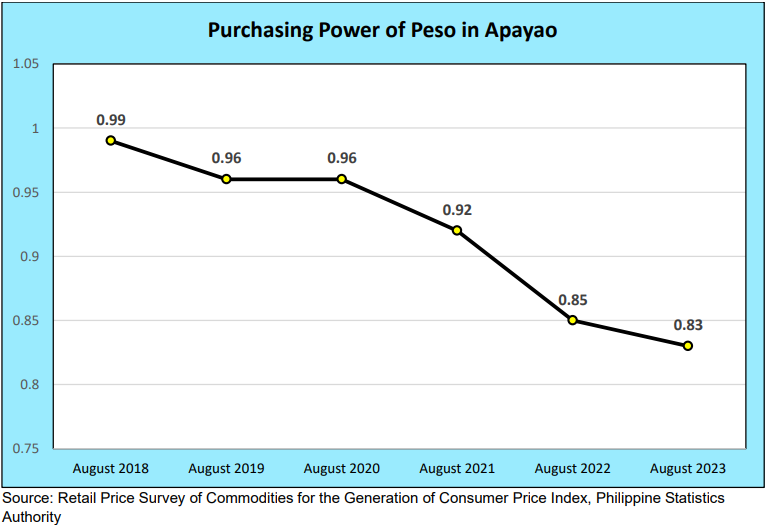Apayao Inflation Rate Increased to 4.6 percent in August 2023
Table 1. Year-on-Year Inflation Rates in Apayao Province, All Items in Percent August 2023 (2018=100)

The province’s inflation rate increased to 4.6 percent in August 2023 from 4.3 percent in July 2023. It was lower by 3.3 percentage point compared with the same month of the previous year at 7.9 percent, and 0.3 percentage point higher than the previous month record of 4.3 percent. (Figure 1 and Table 1)
Figure 1. Year-on Year Inflation Rate, All Items in Percent, August 2022 – August 2023 (2018=100)

Table 2. Year-on-Year Inflation Rates in Apayao, By Commodity Groups in Percent (2018=100)

The main driver in the increase of the province’s inflation rate in August 2023 was primarily due to the increase in the index of the two (2) commodity groups which are: 1) Food and Non-Alcoholic Beverages with 8.8 percent and 81.3% share in the uptrend; 2) Transport with 1.7 percent and 18.7 % share. (Figure 2 and Table 2)
Moreover, the following commodity subgroups which had the highest percent share in the uptrend during the month of August are:
1. Tomatoes with 17.0 percent;
2. Rice with 13.7 percent;
3. Gasoline (ND) with 12.9 percent;
4. Cabbage with 9.6 percent;
5. Banana with 8.8 percent;
6. Other pelagic fish, live, fresh, chilled or frozen with 6.7 percent;
7. Meat of poultry, fresh, chilled or frozen with 4.1 percent;
8. Pineapples, fresh with 4.1 percent;
9. Other leafy or stem vegetables, fresh or chilled with 3.6 percent;
10.Eggplants (aubergines), fresh or chilled with 3.5 percent;
11.Diesel (ND) with 3.2 percent;
12. Liquified hydrocarbons (butane, propane, etc.) delivered in storage containers with 3.1 percent;
13.Pumpkins, squash or gourds, fresh or chilled with 2.0 percent;
14.Garments for women or girls (SD) with 0.9 percent; and
15.Potatoes with 0.9 percent.
On the contrary, eight (8) commodity groups decreased in their inflation rate: 1) Recreation, Sport and Culture at -0.3 percent inflation rate; 2) Restaurants and Accommodation Services at 7.6 percent; 3) Housing, Water, Electricity, Gas and Other Fuels at -0.7 percent; 4) Clothing and Footwear at 5.2 percent; 5) Personal Care and Miscellaneous Goods and Services at 1.0 percent; 6) Furnishings, Household Equipment and Routine Household Maintenance at -2.5 percent; 7) Alcoholic Beverages at 3.0 percent; and Health at 0.0 percent. (Figure 2 and Table 2)
Meanwhile, the remaining commodity groups with constant inflation rate are: 1) Information and Communication at 0.6 percent; 2) Education Services; and 3) Financial Services at 0.0 percent. (Figure 2 and Table 2)
Figure 2. Inflation Rate of All Items by Commodity Groups, Comparison Between July and August 2023

Purchasing Power of Peso (PPP) recorded at 0.82 in August 2023
Purchasing power of peso continues to weaken through the years and reached 0.82 in August 2023. The PPP of 0.82 implies that the Php1.00 in the base year 2018 values only Php 0.82 in August 2023. (Figure 3)
Figure 3. Purchasing Power of Peso in Apayao (2018=100): August 2018 - August 2023

DEFINITION OF TERMS
Consumer Price Index (CPI) measures the overall change in consumer prices based on a representative basket of goods and services over time.
Inflation refers to an overall increase in the Consumer Price Index (CPI), which is a weighted average of prices for different goods.
Purchasing power of the peso shows how much the peso in the base period is worth in the current period. It is computed as the reciprocal of the CPI for the period under review multiplied by 100.
Commodity Groups are group of goods and services found in the market basket of the province. There are thirteen (13) commodity groups which were arranged according to the PCOICOP.
PCOICOP a detailed classification of individual consumption expenditures on goods and services incurred by the three of the five (5) institutional sectors of the 1993 and 2008 System of National Accounts (SNA), namely: (a) households, (b) financial corporations, (c) non-financial corporations, (d) general government, and (e) non-profit institutions serving households. It stands for Philippine Classification of individual Consumption According to Purpose.
FNAB stands for Food and Non-Alcoholic Beverages
ABT stands for Alcoholic Beverages and Tobacco
CF stands for Clothing and Footwear
HWEGO stands for Housing, Water, Electricity, Gas, and Other Fuels
FHERHM stands for Furnishings, Household Equipment and Routine Household Maintenance
IC stands for Information and Communication
RSC stands for Recreation, Sport, and Culture
ES stands for Education Services
RAS stands for Restaurants and Accommodation Services
FS stands for Financial Services
PCMGS stands for Personal Care, Miscellaneous Goods and Services

GEOFFREY B. CALIMUHAYAN
Chief Statistical Specialist
/CBB/ LSBT

